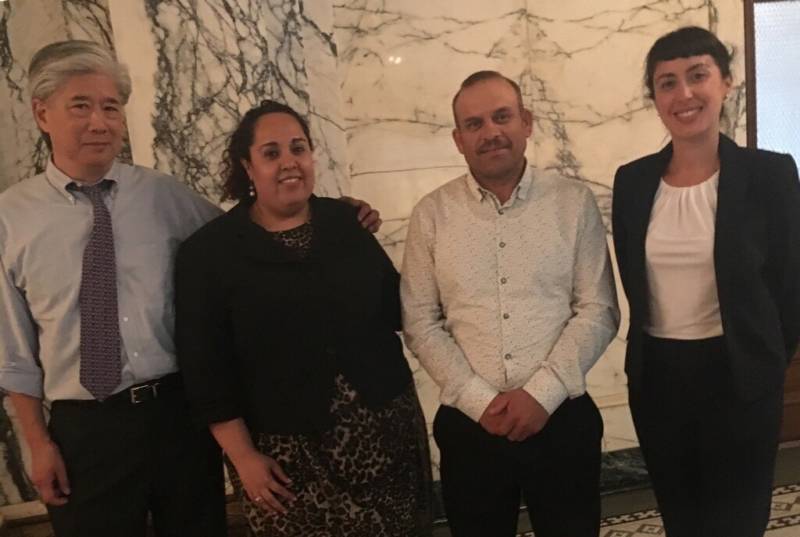Arias said his employer threatened to tell immigration authorities that the other farm was hiring undocumented immigrants if he left to work there. So he stayed at the dairy — for nearly 10 years.
Arias then sued his employer in 2006 for failure to provide overtime pay and meal breaks.
Ten weeks before the start of the trial, his employer’s Fresno-based lawyer, Anthony Raimondo, e-mailed Immigration and Customs Enforcement (ICE), inquiring about Arias’ immigration status and offering full cooperation if the agency wanted to apprehend him at an upcoming appointment related to the lawsuit.
Subsequent court records show Raimondo e-mailed an ICE official what he believed to be Arias’ driver’s license number.
“I hope this helps," Raimondo wrote in the email. "He will be attending a deposition next week. If there is an interest in apprehending him, please let me know so that we can make the necessary arrangements.”
Raimondo told KQED his intention was not to report Arias to ICE, but rather to find out his immigration status, and if he was undocumented, to then file a complaint with the Legal Services Corporation, a publicly funded group that provides funding to CRLA — the group representing him.
"I would like to prevent these attorneys from providing any further services at the taxpayers’ expense,” Raimondo wrote in the email to the ICE official.
“I’m the only person in this case who didn’t break the law,” Raimondo recently told KQED.
After learning of Raimondo's contact with ICE, Arias’ attorneys sued Raimondo individually for unlawful retaliation under federal labor law.
In its opinion, the appeals court wrote that Raimondo had a "pattern and practice" of contacting ICE about workers who asserted their rights against employers.
In 2013, Raimondo wrote an email to LSC's Office of Inspector General, in which he stated, "The times when I have had litigants deported, I have always simply taken action rather than make any threats. The attorneys find out when their clients are already gone."
In response, Raimondo told KQED: "All I ever did was tell the truth to law enforcement. Is that illegal?"
The California Legislature also approved SB 666 in 2013, which made attorneys in the state subject to suspension, disbarment or other discipline if they reported the immigration status of a witness, a party to a civil action, or his or her family members because the witness or party exercised a right related to employment.
"What I did was 100 percent legal at the time that I did it,” Raimondo said. “If the law changes later, how does that impact what I did?"
The Fair Labor Standards Act (FLSA) prohibits employers from retaliating against workers for making minimum wage or overtime claims.
But Raimondo's lawyer argued in federal district court that his client could not be held liable because he was not actually Arias' employer, a position the court supported.
Arias' lawyers appealed the decision, and the 9th Circuit reversed the lower court's decision, ruling that third parties acting on behalf of employers can still be liable for unlawful labor retaliation.
In the case, 9th Circuit Judge Stephen Trott challenged Raimondo's defense: “That’s expanding the definition of employer to make sure that there’s no loophole here, and you can’t just go get the mafia to threaten people.”
Christopher Ho, an attorney at Legal Aid at Work, said the decision marks the first time an appeals court has ever ruled that an employer's attorney can be held personally liable for retaliation against workers.
“It makes it not possible for an employer to get around the law [by] just having somebody he or she knows do that dirty work for them,” he said.

